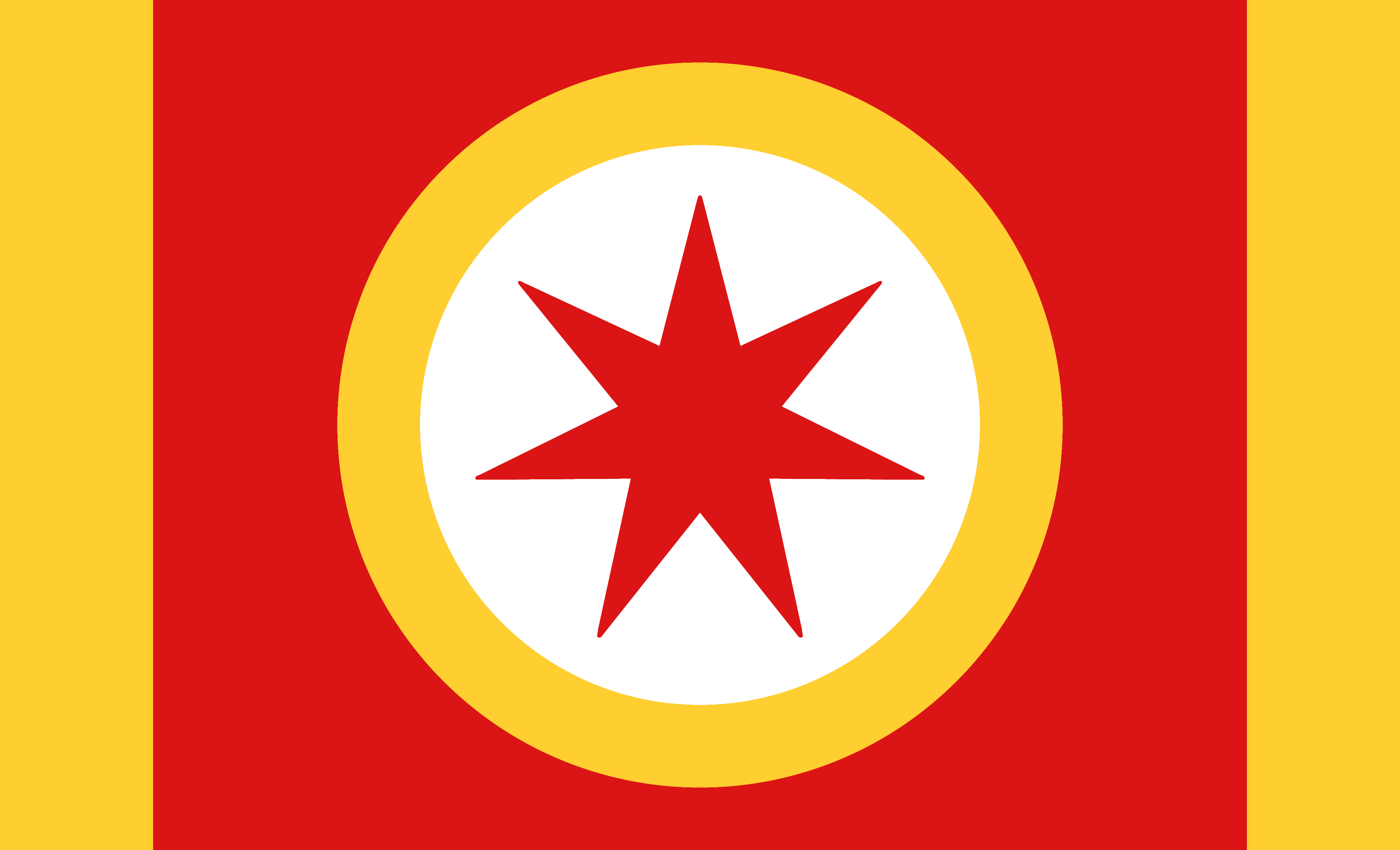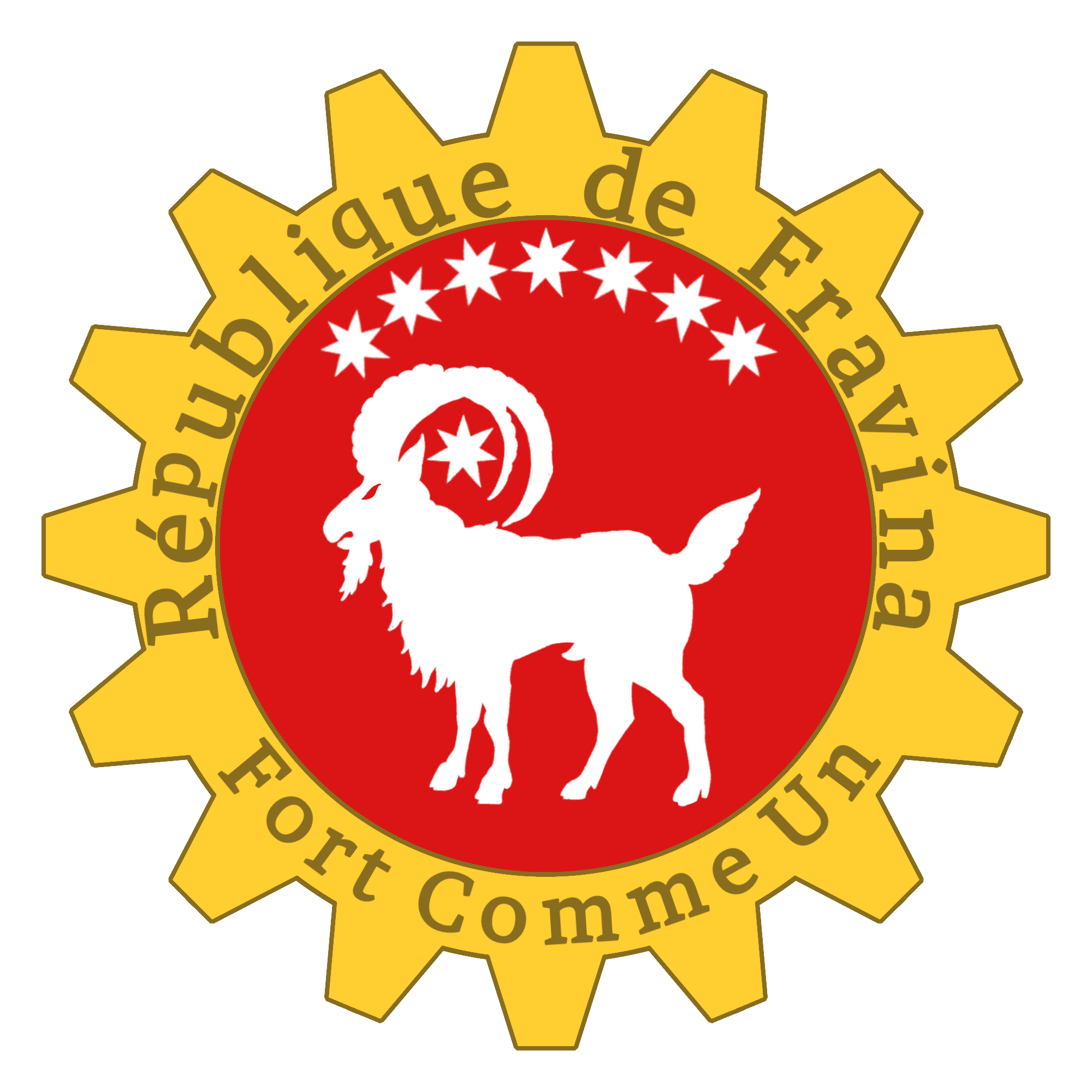Fravina
This article is incomplete because it is pending further input from participants, or it is a work-in-progress by one author. Please comment on this article's talk page to share your input, comments and questions. Note: To contribute to this article, you may need to seek help from the author(s) of this page. |
Republic of Fravina République de Fravina | |
|---|---|
| Motto: Fort Comme Un Strong as One | |
| Anthem: "La Varsovienne" | |
| [[File: |frameless|alt= |upright=1.15]] | |
| Capital and largest city | Port de Sang |
| Official languages | Lysian |
| Recognised national languages | Frav |
| Ethnic groups (2019) |
|
| Demonym(s) | Frav (singular)
Fravs (plural) Fravi (adjective) |
| Government | semi-direct democratic federal republic |
| Bernard Beaumont | |
| Adelie Grasse Valentine LaClaire Jean Martin Louise Rochefort | |
| Legislature | People's Council |
| Wing of Examination | |
| Wing of Legislation | |
| Establishment | |
• Treaty of Labrador | 8 October 1810 |
• First Constitution of Fravina | 24 April 1811 |
• Treaty of Valensole | October 1948 |
• Second Constitution of Fravina | 16 June 1949 |
| Population | |
• 2019 census | 37,654,800 |
| GDP (nominal) | 2019 estimate |
• Total | 434,829,346,344 |
• Per capita | 11,547.78 |
| Currency | aure (Ā) (AFR) |
| Time zone | UTC ( ) |
| Date format | dd-mm-yyyy AD |
| Driving side | right |
| Internet TLD | |
Fravina (French: Fravina), officially the Republic of Fravina (Lysian: République de Fravina) is a country on the continent of Argis on the planet of Eurth.
Fravina is a semi-direct democratic federal republic, with three separate branches of government and a bicameral legislature, called the People's Council of Fravina. The nation's executive branch is headed by the president and four vice presidents, known as the Vice Presidential Council.
Etymology and Pronounciation
The name Fravina derives from the indigenous Frav People and the Frav word ina, which translates as river. The river in the name of Fravina refers to the Belle River.
History
Indigenous peoples and pre-colonial era
Europan colonization
Fravina was colonized by Lysia, and was part of the colony of Lysian Columbia.
Lysian Columbia
Lysian Columbia gained its independence from Lysia in 1778. As part of the nation, Fravina participated in the Delamarian War of 1804 against Labradoria. This resulted in a Columbian loss. In the Treaty of Labrador (1810), Fravina was made independent from Lysian Columbia.
First Republic
The First Republic of Fravina had collected a large debt during the Delamarian War that it struggled to pay off. The debt continued to increase during the Fravina Shipping Crisis of 1833, the Native Fravi Rebellions, and the Fravina Labour Strikes of the 1880s. By the late 1800s, Fravina suffered from corruption.
Civil War and Socialist Revolution
The Fravi Civil War (1896-1904) between the Indigenous Confederacy, Fravi Socialists, and the First Republic of Fravina. Beginning with the Proclamation of Indigenous Independence in October 1896, the war grew to include the Socialists when President Pierre Antier began persecuting the group in an attempt to stop the Socialists from expressing support for the Indigenous Confederacy. Despite intiail losses, the Republic won the war with the help of foreign powers intervening on the side of their side.
In the post-war period, Fravina struggled to rebuild with their even bigger debts. The struggles of the period emboldened the socilaist movement. Following the assassination of socialist politician Maxim Batton and the 1941 Suspension of Fravi Congress, riots broke out across the nation, beginning the Fravi Socialist Revolution (1942-1948).
The Socialists grew in size during the interim period, with indigenous groups and the lower classes joining the movement. This contributed to the socialist victory of 1948. The revolution unofficially ended in August 1948 with the Capture of Fort d'Olivier by General Jacque De Mercy, and it officialy ended in October 1948 the signing of the Treaty of Valensole.
Contemporary Fravina
The Second Republic of Fravina was formed on 15 October 1948, with General Jacque De Mercy ruling as the first president. His tenure, as well as the tenure of his two successors, were marred with corruption, poverty, and crime.
In the late 1980s and 1990s saw an increase in the standard of living in Fravina. Poverty, corruption, and decline were all on a decline during these decades. This success was largely accredited to the reforms of Presidents Marie Boche and Pierre Blanchet.
Geography
Fravina is mostly hilly and mountainous in some parts.
Port de Sang is the capital and largest city. Other major cities are Fort d'Olivier, Port de Barbier, Belleville, and Beaufort.
Politics and Government
Fravina is a semi-direct democratic federal republic, with three separate branches of government and a bicameral legislature, called the People's Council of Fravina. The nation's executive branch is headed by the president and four vice presidents, known as the Vice Presidential Council. Fravina's judicial branch is made up of a series of courts, with the Supreme Court acting as the highest court of appeals in Fravina.
Political Divisions
Fravina is principally divided into 6 provinces.
Political Parties and Elections
The government of Fravina officially recognizes six national political parties. This includes the Socialist Party, the Social Labour Party, the Liberal Party , the Conservative Party, the Capitalist Party, and the National People's Party. Legislative elections are held every 5 years on the second weekend of December, and examination elections are held every 10 years on the second weekend of December. These elections determine the seats of the People's Council, of which the majority coalition of the Wing of Legislation forms the government. The last time Fravina failed to form a government was following the 2010 election, which led Fravina to be without an executive until the 2015 election, when Red Flag Coalition retook control of the Wing of Legislation.
In Fravina, there are two major political coalitions. The Red Flag Coalition is a leftist coalition of the Socialist Party and the Social Labour Party. The United Center Coalition is a centrist coalition of the Liberal Party, the Conservative Party, and the Capitalist Party. The National People's Party, which is consiered far-right, is the only national party that is not part of any major coalition.
Social Labour Bernard Beaumont, winner of the 2015 and 2020 elections and former vice president, is serving as the 8th President of Fravina. The four vice presidents are Adelie Grasse, Jean Martin, Louise Rochefort, and socialist Valentine LaClaire. Leadership of the Wing of Examination is Chief Examiner Antoine Cartier. Leadership of the Wing of Legislation is Chief Legiislator Ella Lambert.
In the 16th People's Council of Fravina, the Wing of Legislation and Wing of Examination are controlled by the Red Flag Caucus. The Wing of Examination consists of 82 Social Labour seats, 20 Conservative seats, 19 Liberal seats, 13 National People's seats, 10 Capitalist seats, and 7 Socialist seats. The Wing of Legislation consists of 191 Social Labour seats, 54 National People's seats, 52 Socialist seats, 31 Conservative seats, 31 Liberal seats, 13 Capitalist seat, and 3 independent seats. Of provincial governors, there are 3 Social Labourers, 2 Liberals, and 1 Conservative.
Military
The Fravi Armed Forces (Forces Armées Fravi) are the military and paramilitary forces of Fravina, under the President of Fravina as supreme commanders. They consist of the Fravi Army (Armée de Terre Fravi), the Fravi Navy (Marine Fravi), the Fravi Air Force (Armée de l'air de Fravi), and the Fravi Civilian Army (Armée Civile Fravi), which acts as an emergency police force during national crises.
Fravina's military forces are primarily composed of drafted soldiers.
Foreign Relations
Economy
Energy
Industry
Infrastructure
Transport
Demographics
Ethnic Groups
Education
As of 2017, Fravina has a simple literacy rate of 98.8% and a functional literacy rate of 93.3%


